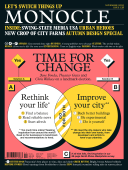
Issue 138
“Time for change” is the theme of Monocle’s November issue. It’s packed with inspiration, ideas and long reads covering everything from urban heroes who are improving cities to businesses on the rise and voices from the media in US swing states. Inside is everything you need to rethink how the worlds of politics, business, design and travel work. Plus: offbeat wines, fashion fixes and canny developers to watch.
In This Issue
Oops! No content was found.
Looks like we no longer have content for the page you're on. Perhaps try a search?
Return Home

